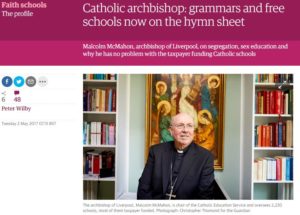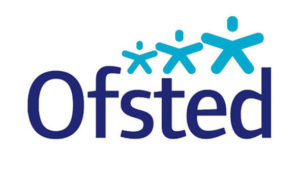“Public funds are being used to separate children by faith. What could be more damaging to integration?”
Watch, listen, subscribe to Faith Schoolers Anonymous.
FSA team
“Public funds are being used to separate children by faith. What could be more damaging to integration?”
Watch, listen, subscribe to Faith Schoolers Anonymous.
FSA team
“Rather than defending this appalling record of disproportionately turning away poorer children at the gate, wouldn’t the Archbishop be better off doing something about it?”
 This morning (2 May 2017), the Education Guardian published a probing (and excellent) interview by Peter Wilby with Malcolm McMahon, the Roman Catholic Archbishop of Liverpool and chair of the Catholic Education Service (CES). The Archbishop’s views on the role and ethos of the CES’ schools should trouble us all. Some examples.
This morning (2 May 2017), the Education Guardian published a probing (and excellent) interview by Peter Wilby with Malcolm McMahon, the Roman Catholic Archbishop of Liverpool and chair of the Catholic Education Service (CES). The Archbishop’s views on the role and ethos of the CES’ schools should trouble us all. Some examples.
Wilby rightly notes that the CES’ model approach to teaching relationships and sex education to children contains no mention of ‘homosexual’ or ‘gay’ at any stage, and when asked whether or not Catholic schools teach about gay relationships, the Archbishop limply replies that ‘Christian teaching “is at the centre of our schools”’. So far, so worrying. And it doesn’t get any better.
Asked if some pupils at Catholic schools have same-sex parents, the Archbishop gives the quite remarkable response: ‘Why would same-sex parents want to send their children to a Catholic school?’ Well, if the views of the Archbishop are the same as those espoused by his schools, why indeed.
This response may not be that surprising, but it is no less scandalous for it. This is a man responsible for overseeing the education of more than 800,000 children, and he is openly admitting that the 2,000 publicly funded schools in his charge are not necessarily appropriate for same-sex parents and their children. The Archbishop claims that Catholic schools would nonetheless treat ‘them’ with respect, but one wonders how much respect these schools can really be showing to people whose existence is ignored in everyday teaching or whose sexuality is described as sinful.
Moving on, the Archbishop appeared more than a little defensive when asked about the record of Catholic schools on serving the most needy in their communities. After McMahon misleadingly claimed that ‘the proportion of pupils in Catholic schools from deprived areas…[is] above average’, Wilby puts it to him that given the location of many Catholic schools in poor urban areas, they should actually be admitting far more poorer pupils than they do. The Archbishop responds: ‘You do this for a living, do you? You ask questions based on inaccurate information?’ A nerve struck.
Far from being ‘based on inaccurate information’, Wilby’s questioning is precisely right. The evidence consistently reveals that Catholic schools admit far fewer poor children than they should given their areas. For instance, research conducted by the Fair Admissions Campaign using official government data found that Catholic schools admit a staggering 28% fewer children eligible for Free School Meals than they should given their local areas, while the Sutton Trust reported earlier this year that ‘faith’ schools (with Catholic schools among the worst offenders) are ‘three times as socially selective compared to their catchment area than non-faith schools’.
And we must be careful not to get sucked in by the CES’ consistently misleading language on this. As Wilby suggests, whilst Catholic schools are more likely to be situated in more deprived areas, this is not the same thing as being more likely to admit deprived pupils. In fact, analysis clearly shows that Catholic schools are even more likely to be in deprived areas than their pupils are. Situated in deprived areas they may be, but welcoming of deprived families they are not.
Rather than defending this appalling record of disproportionately turning away poorer children at the gate, not to mention children from certain ethnic minorities, wouldn’t the Archbishop be better off doing something about it? He doesn’t seem to think so.
Nor, indeed, is he ready to give up on the transparently false assertion that ‘by canon law, schools are forbidden to turn away Catholic parents in favour of non-Catholics’. This was the claim that ultimately led the Government to announce that it will be dropping the 50% cap on religious selection and no longer requiring new religious schools to keep at least half of their places open to all local children, irrespective of religion or belief. No matter that the CES’ canon-law claim has absolutely no basis in fact (see the British Humanist Association’s excellent briefing on this for details). And no matter that the 50% cap was a demonstrable success, significantly boosting both integration and the access of local families to their local schools, contrary to the Government’s own false assertions.
Wilby’s parting advice in his article is that if one is to find themselves speaking with the Archbishop, ‘it’s perhaps best to avoid the subject of who is allowed to go to Catholic schools, or what goes on behind their walls.’ Unfortunately, this is advice that the Government already seem to be acting upon.
FSA team
“If inspectors are not independent from the schools they are inspecting, the welfare and education of children will always be at significant risk.”
 A year and a half ago the British Humanist Association published an exposé revealing that since 2007 two Ofsted inspectors from the strictly Orthodox Charedi Jewish community had consistently given favourable reports to the Charedi schools they were inspecting, leading to doubts over their impartiality and independence. The two inspectors were subsequently dropped by Ofsted.
A year and a half ago the British Humanist Association published an exposé revealing that since 2007 two Ofsted inspectors from the strictly Orthodox Charedi Jewish community had consistently given favourable reports to the Charedi schools they were inspecting, leading to doubts over their impartiality and independence. The two inspectors were subsequently dropped by Ofsted.
Since then, more or less all of the schools involved have been re-inspected by Ofsted, and the reports from those inspections reveal both the enormity of the scandal and the scale of the impact that it is likely to have had on the pupils whose education went without the oversight it so badly needed.
In 2009, one of the two inspectors, Chanan Tomlin, rated Gateshead Jewish Boarding School as ‘good’ in almost all areas – apart from in pupils’ spiritual, moral, social and cultural development, for which he graded the school ‘outstanding’. In July 2016, however, when the school was re-inspected, inspectors found that ‘leaders and managers do not ensure that pupils are effectively prepared for life in British society’, that there was not sufficient ‘time during the school day to learn secular subjects’, and that pupils proficiency in English was under-developed. The school was deemed ‘inadequate’.
‘There were no formal mathematics or English lessons timetabled beyond year 9.’
In 2010, Chanan Tomlin also inspected Beis Hatalmud School in Manchester, rating it in exactly the same way as he had Gateshead Jewish Boarding School. However, when the school was re-inspected in 2015 it was deemed to ‘require improvement’, and a year after that the school was told that it hadn’t met the independent school standards. The reports note that ‘there were no formal mathematics or English lessons timetabled beyond year 9.’
In 2011, Talmud Torah Toldos Yakov Yosef was inspected by Chanan Tomlin too. It was awarded the same (and seemingly trademark) ‘good’ rating. The school has had four inspections since then, each of which has found that the school is failing to meet a variety of independent school standards.
 A similar story is true of Talmud Torah Bobov Primary School, but in this case, both of the two inspectors involved in the scandal had previously inspected the school. In 2008, Chanan Tomlin rated the school as ‘good’, and in 2011 Jonathan Yodaiken (the other inspector) did the same. Fast forward to 2015 and the school is rated as ‘inadequate’ in every area. This included a failure to actively promote principles ‘which further tolerance and harmony between different cultural traditions by enabling pupils to acquire an appreciation of and respect for their own and other cultures’ and a failure to effectively prepare ‘pupils for the opportunities, responsibilities and experiences of life in British society.’
A similar story is true of Talmud Torah Bobov Primary School, but in this case, both of the two inspectors involved in the scandal had previously inspected the school. In 2008, Chanan Tomlin rated the school as ‘good’, and in 2011 Jonathan Yodaiken (the other inspector) did the same. Fast forward to 2015 and the school is rated as ‘inadequate’ in every area. This included a failure to actively promote principles ‘which further tolerance and harmony between different cultural traditions by enabling pupils to acquire an appreciation of and respect for their own and other cultures’ and a failure to effectively prepare ‘pupils for the opportunities, responsibilities and experiences of life in British society.’
In 2012 Wiznitz Cheder School in Hackney was inspected by Jonathan Yodaiken who rated it as ‘good’ in most areas, ‘outstanding’ in some. In 2016, inspectors identified ‘unmet independent school standards’. Safeguarding was inadequate, health and safety was inadequate, and the school leaders were found to be failing to fulfil all their responsibilities effectively.
In 2013 Chanan Tomlin rated Talmud Torah D’Chasidei Gur ‘outstanding’ overall. The ‘teaching is outstanding’, the ‘curriculum is outstanding’, the ‘leadership and management are outstanding’, he noted. However, at its next inspection in late 2015, the school was rated ‘inadequate’ across the board. ‘Outcomes for pupils are inadequate’, ‘the arrangements for safeguarding are ineffective’, and ‘the curriculum does not provide pupils with a sufficient breadth or depth of learning’, the report noted. In June 2016, after a follow-up inspection, the independent school standards were still not met.
“Leaders are aware that this disregards the protected characteristic of sexual orientation within the 2010 Equality Act.”
In 2014, Jonathan Yodaiken inspected Talmud Torah Machzikei Hadass School in Clapton Common, London. He gave the school a ‘good’ rating, though it only narrowly missed out on an ‘outstanding’. Eight months later, in July 2015, the school received an emergency, no-notice inspection. The report stated that ‘the school does not promote pupils’ safety and well-being well enough’, that school leaders asserted that ‘English tuition beyond Key Stage 3 is provided at home’, and that ‘the school’s ethos identifies its founding principle as “unconditional adherence to the Shulchan Aruch (code of Jewish law)”. Leaders are aware that this disregards the protected characteristic of sexual orientation within the 2010 Equality Act.’ The school has had two further inspections since then, the most recent just two months ago. It is still failing to meet all the necessary independent school standards.
Finally – you’ve probably got the message by now – Talmud Torah Yetev Lev in Salford was inspected by Jonathan Yodaiken in July 2013 and given ‘good’ ratings across the board. Unlike the schools above, however, it hasn’t been re-inspected since the BHA exposé. And this isn’t just despite all we know about the other schools. It’s also despite the fact that its sister school in Hackney, which shares the same name and the same proprietor, has been judged ‘inadequate’ and failed to meet the independent school standards on each of the last four occasions it has been inspected. Surely that’s cause for concern.
Unfortunately, Yetev Lev isn’t the only school that’s been neglected in this way. Tashbar of Manchester was rated good by Chanan Tomlin in 2012, but hasn’t been re-inspected since either. And there may well be others we don’t know about.
The relatively small amount of media attention that this story received when it broke 18 months ago – covered only in the education paper Schools Week – should not disguise the fact that this is one of the biggest scandals in Ofsted’s recent history. Ofsted is criticised constantly, of course, and a lot of that criticism fails to acknowledge how difficult a job it does. But if its inspectors are not independent from the schools they are inspecting, children are placed at significant risk. Its reaction to the BHA’s exposé has been largely positive, and they must be commended for that. But as our follow-up research demonstrates, they’ve still got work to do.
FSA team